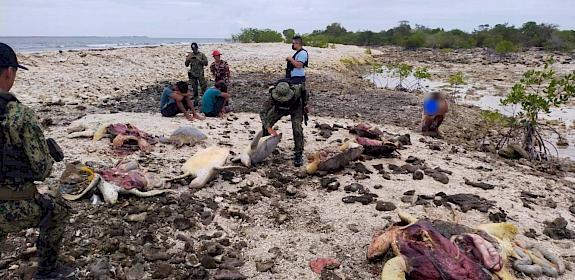New Indonesian seizure of helmeted hornbill casques shows trade ongoing, targeted investigations needed
Pressure continues to pile on for the Critically Endangered Helmeted Hornbill, targeted for its ivory-like casque, as Indonesian authorities seized ten pieces from a trafficker on 6 August 2022 in North Sumatra. A similar seizure occurred in the same district just 6 months earlier.
Police caught a local man with a backpack full of the Helmeted Hornbill Rhinoplax vigil casques after he had offered the casques for sale on Facebook. According to Indonesian media, the suspect is linked also to the last major seizure of Helmeted Hornbill casques: In November 2020, 71 casques, pangolin scales, and the skin and bones of a Sumatran Tiger were seized from another illegal trader.
“It’s great that this trader was stopped but the connection with a case from two years ago shows how traders are linked, have access to illegally acquired stocks of wildlife parts, and bide their time to sell them,” said Kanitha Krishnasamy, Director for TRAFFIC in Southeast Asia.
Thorough investigation aiming to cripple the criminal trade chain is needed urgently to help the species’ grave situation. Seizures alone will not halt the targeting of this species.”
Kanitha Krishnasamy, Director for TRAFFIC in Southeast Asia
In a separate confiscation on the same day, 38 kg of pangolin scales were obtained, also in North Sumatra. This points to the important role North Sumatra plays in this trade and the frequent discovery of other heavily trafficked wildlife species alongside Helmeted Hornbill casques.
In November 2021 three people were caught for trafficking in pangolin scales and Helmeted Hornbill casques in Deli Serdang and Medan, also located in North Sumatra.
“Traffickers see the casques as yet another luxury wildlife product they can market alongside other species prized in illegal trade. To have any chance at curbing the illegal extraction of these hornbills and so many endangered species, authorities must pay greater attention to what’s going on in North Sumatra,” said Marison Guciano, Executive Director of FLIGHT. In 2015, due to the severe increase in poaching for the illegal trade, the Helmeted Hornbill was reclassified from Near Threatened to Critically Endangered on the IUCN Red List of Threatened Species. This hornbill is found only in Indonesia, Brunei, Malaysia, Myanmar, and Thailand but generally occurs in low numbers.
The Helmeted Hornbill is also listed in Appendix I of the Convention on International Trade in Endangered Species of Wild Fauna and Flora (CITES), making it illegal to trade internationally for commercial purposes.
From 2018–2021 at least 690 Helmeted Hornbills and their parts were seized from illegal trade globally, with casques and skulls making up the bulk of items recovered from traffickers and illegal traders. Seizures were made in Indonesia, Malaysia, Thailand, China and the UAE indicating the wide reach of the illegal trade in this species.
TRAFFIC data show that four people were convicted for illegal possession and trade of 99 Helmeted Hornbill casques in Indonesia in 2021, with courts issuing a total of USD13,524 in fines and 53 months in jail time. Most of the perpetrators were prosecuted in Sumatra and one in Central Java.





